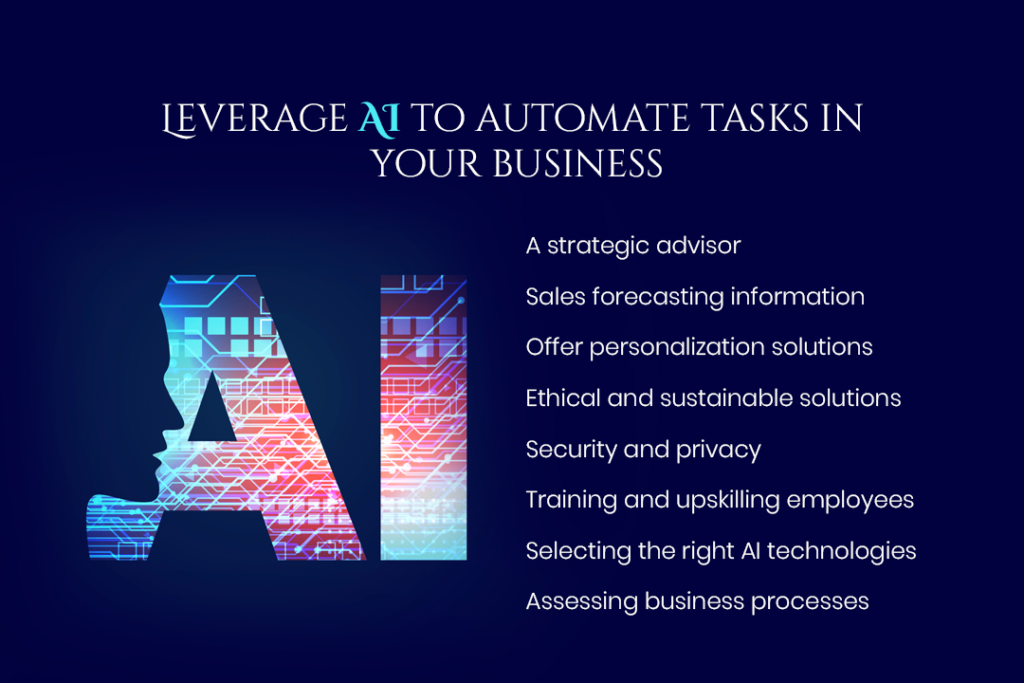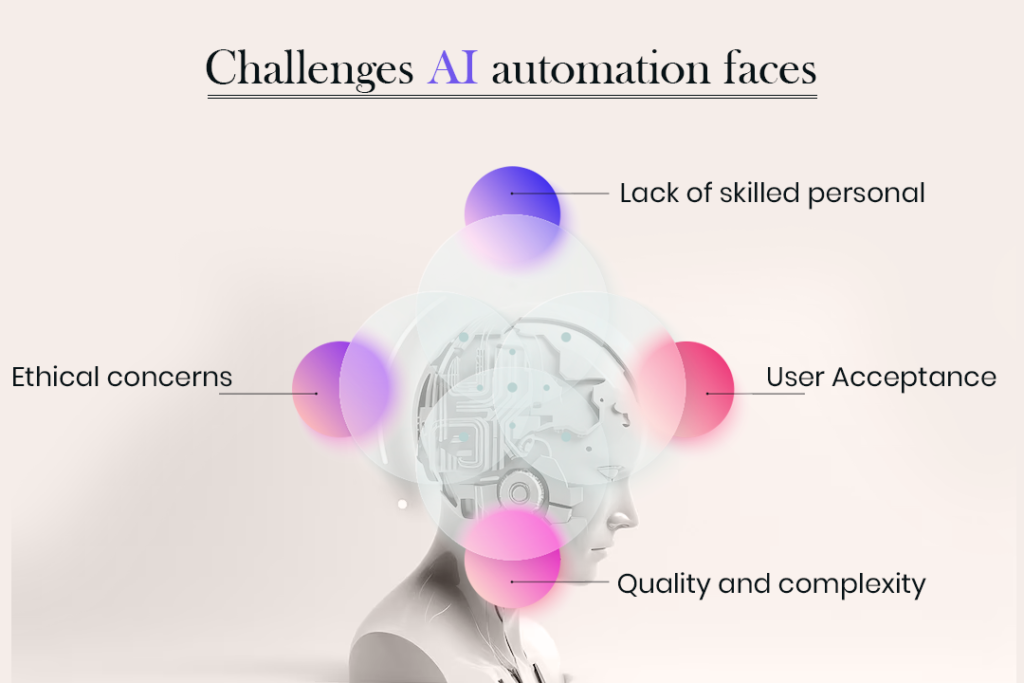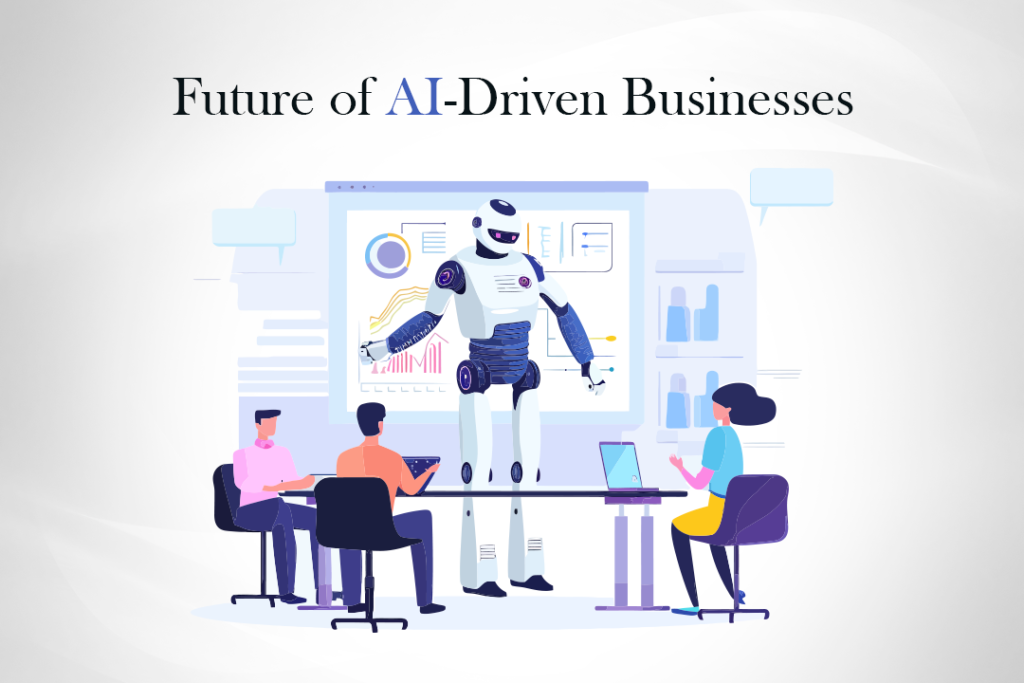Leveraging AI to automate tasks in your services can be beneficial to your business in many ways. According to Statista, North America has become a primary regional AI market, and the AI market was estimated to be worth 24.9 billion USD in 2022. This data shows a considerable interest in using AI among the leaders in North America. But why AI? What significance does AI have in the software industry? That’s all we’re going to discuss about in this blog.
Leverage AI to automate tasks in your business

A strategic advisor
Use it as a strategy advisor. It helps in market analysis and trends. It also helps in understanding customer behavior, economic changes, and future demands and motivates you to make data-driven strategies and informed decisions. As a result, you come up with minimizing risks and focusing on new opportunities.
Sales forecasting information
There are AI tools available to get sales forecasting information. This helps businesses to plan and allocate resources strategically. Plus, AI tools help in finding potential customers. They do that with knowledge of certain behaviors online and demographics. That creates opportunities for personalized sales offers.
Offer personalization solutions
AI-powered tools enhance the ability to learn customer behaviors and preferences. This way, you can offer personalized solutions to customers. You can offer them recommendations that will boost the engagement rate. AI chatbots will be available to answer certain queries and register complaints. With each interaction, the AI becomes more effective and efficient in customer service and will save you time.
Ethical and sustainable solutions
Your AI solutions will help you in offering ethical use of products. It promotes fairness and maintains transparency. AI will help you find sustainable solutions that will be environment friendly and will also give you long-term growth. This will promote societal well-being and the reduction of waste.
Security and privacy
AI helps in the integration of robust encryption and regular auditing access controls and follows data protection rules and regulations. The protection rules are GDPR or HIPAA. So, best security practices are a must to avoid future risks and minimize vulnerabilities.
Training and upskilling employees
Take help from tailored workshops, online courses, and hands-on projects to train and upskill employees. Let them learn daily by emphasizing one project at a time. That should cover from bridge theory to a practical scenario. A culture of continuous learning will be beneficial to your team.
Selecting the right AI technologies
First, you need to specify your software needs and business goals. Selecting technologies would depend on it. Try to consider some significant factor solutions such as machine learning models, data processing capabilities, and scalability. Moreover, you need to choose between a pre-trained model or custom development according to your needs. With that, regular adaptation in AI strategy is crucial.
Assessing business processes
First, you need to identify the repetitive, manual, and time-consuming tasks. Moreover, think of tasks with clear rules and structured data. These tasks are more suitable for automation work. Then, prioritize tasks that need a minimal amount of human involvement. Lastly, make a budget by evaluating the costs and risks to it.
Challenges AI automation faces

Lack of skilled personal
It’s tough to find a skilled person in the field as the demand for it is getting high. More often, it crosses the numbers of what is needed. Thus, it becomes hard to hire someone with qualified expertise in less time.
Ethical concerns
User acceptance
Since it’s believed that employees’ job security is in danger because of AI automation, it’s challenging for them to accept it completely. Not only that, but AI can also cause some people to distrust technology. Besides, some people have a preference for human interaction to work that AI can’t give.
Quality and complexity
Understanding AI’s interpretations can be challenging, which can lead to low-quality products. It can happen mostly with complex projects and leads the whole team to a lack of trust and transparency.
Overcoming implementation challenges
Fill the skill gaps
Put efforts into training to fill the skill gaps among employees. Invest time and money to build their confidence through the right training so that they adapt well and work alongside AI confidently.
Ethical ai practices
Always adhere to ethical AI practices. Prioritize the rules and regulation concerns for AI development. Ensure fairness and accountability to build trust among stakeholders, customers, and team.
Customer education
Make sure to provide educational knowledge related to AI to customers, teams, and stakeholders. Let them know its benefits and challenges so they can prepare themselves for this new change. With the right understanding, acceptance comes in anything.
Continuous monitoring and improvements
Put monitoring mechanisms in place to work continuously on assessing all the AI performances. Identify the areas you want to improve and plan strategies to employ them. This is important for the constant evolution of AI performance.
Examples of Successful AI Integration
Language translation with Google
It utilizes AI with the help of natural language learning to provide language translations. It has helped a lot in each sector and ordinary people’s lives by breaking the language barriers. Worldwide.
Chatbots in customer service
Many companies are using AI-powered chatbots in their customer service systems. The chatbots handle queries and complaints from users and customers. It minimizes agent involvement and improves efficiency.
Netflix recommendation system
Netflix used AI algorithm techniques to view the history, preferences, and behavior of users online. That’s how then it recommends users content of their liking. This system has enhanced the engagement rate and satisfaction of users.
Fraud detection at PayPal
PayPal employs AI to detect fraud. It helps in analyzing millions of transactions in real-time. Machine learning techniques find unusual patterns and potential fraud activities. It enhances the security of online transactions.
Future of AI-Driven Businesses

Advanced machine learning algorithms
AI’s ability to automate complex business processes will continue to grow. It’ll enhance more sophisticated machine learning algorithms, which involve deep learning, reinforcement, and generative models.
Natural language processing (NLP)
Improved language understanding and generation capacity will be enhanced. Naturally, communication between AI and humans will find new and easier ways. More sophisticated automation in customer service, data analysis, and content creation will be enhanced.
Robotic process automation (RPA) integration
RPA will be helpful in streamlining repetitive tasks in the workflow. It’ll allow end-to-end automation in many business functionalities.
Analytics and forecasting
It’ll also enhance forecasting and go beyond historical analysis. That will help businesses to get more accurate predictive results in the section on trends, market changes, and potential risks.
AI-powered cybersecurity
Machine learning will be enhanced to detect any cyber harm in real-time. It’ll be beneficial for businesses to increase the security of the digital environment. With that, human collaboration will be much better.
Human-AI collaboration
The collaboration between the two will enhance and offer a more efficient approach to tackling problems in the industry. Decision-making will be more accessible, and seamless facilities will be available for better collaboration in various sectors of business.
Final words
AI pushes the boundaries and thinks what’s beyond. It’s not limited to bringing life to ideas or thoughts. Leveraging AI to automate tasks to increase innovation and product development has become necessary to do the impossible things.
Do you have a project idea in which you need AI integration? Please write us your concerns and requirements about the project. StakkDev Inc., as a SaaS company, provides services to integrate AI plugins.

Leave a Reply